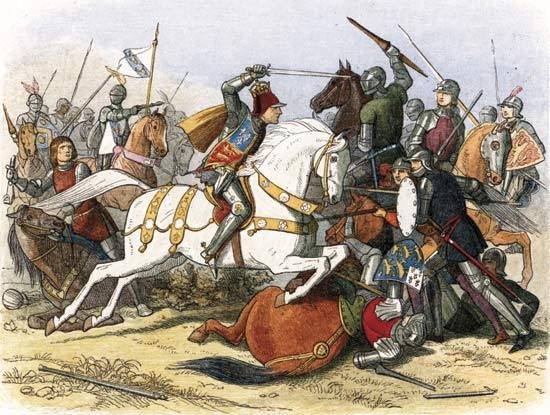
The Fall of Pride
For nearly all humans, the deeper questions of good and evil cross the average mind at least once in any average lifetime. For some, this discussion becomes the driving purpose and reason for living, while others merely consider it as a flight of fancy. Great works of literature have always played a crucial role in driving this endless discussion forward into uncharted territory.
In William Shakespeare's plays Richard III and Henry IV, the main characters Richard and Hal both provide some insight into these deep questions through their words and actions, but both do so in notably different ways. These flashes of insight can shine a powerful source of light onto questions of how both of these characters perceive pride and how that perception alters their actions and behavior. These differences become noticeable quickly in the play and effectively foreshadow each characters fate.
In Richard III, the main character Richard shares his views of the moral world in both action and word. Simply put, others exist in Richard’s world, and that world is his to control and manipulate. Richard is only obvious about his prideful ventures when it serves his purpose, or when thinking to himself out loud. His pride and desire for power is the main factor in his decisions, whether seeking exaltation of the throne, or denying promises made to those around him to spite those who refuse his wishes. At times, he revels in his role as a prideful antagonist by controlling the actions of others:
And therefore since I cannot prove a lover
To entertain these fair well-spoken days,
I am determined to prove a villain
And hate the idle pleasures of these days. (1.1.28-40)
Externally, Richard gives the impression that he seeks peace and calm while he actively works to destroy it for the sake of his own power through the chaos. His prideful nature thrives best in a chaotic environment since he is often the only one willful enough to take advantage of the confusion created in those around him. Richard moves his players around like pawns on a chessboard through deceit or pressure in order to create chaos where there was none before. His closest confidant, Buckingham, is also his most prized puppet.
Richard utilizes Buckingham in nearly all of his plots while promising the world to him. Though Buckingham works intensely for the sake of Richard’s power, Buckingham is eventually betrayed by Richard in true villain fashion when Buckingham feels the pain of his conscience reminding him of his folly. Richard leaves no illusions of his feelings towards on the concept of a conscience. "Conscience is but a word that cowards use, / Devised at first to keep the strong in awe" (5.3.317-18).
Though he revels in his ability to manipulate others, he is unable to escape his own conscience, which he attempts to ignore. “O coward conscience, how dost thou afflict me!” (5.3.185) When faced with the guilt of his conscience, a simple reminder of the worldly gains of power and possessions overrides the pain. Underneath his twisted exterior, Richard at times appears as if he is two characters in one – a tormented slave dominated by a prideful illusion of a prince. Throughout the play however, Richard gives no indication of any emotional depth beyond a typecast villain. He is pride and greed embodied in a way that removes him from the uniquely struggles that occur on a daily basis throughout the history of human existence. This deep struggle is demonstrated much more profoundly in other characters throughout the works of Shakespeare.
In one way, Prince Hal of Henry IV utilizes illusion and manipulation for the sake of his own identity. However, the similarities between him and Richard stop when considering the underlying purpose for the manipulation. Whereas Richard manipulates to attain power, Hal deceives others in order to appear powerless. Hal doesn’t view the world as his to control, but rather he acts as a fool without a care for deeper issues of honor and integrity. Hal discretely mentions his impending role of responsibility as something he plans and desires to do, though he seems to be in no great hurry.
“So, when this loose behavior I throw off
And pay the debt I never promised,
By how much better than my word I am,” (1.2.201-03)
Hal intentionally gives the appearance to others that he has no desire to be in any role of responsibility in order for his transformation to appear that much more miraculous when he does eventually take up the destined role of Prince and King. The prideful nature of Hal sought to control his destiny, but reality snatched him from his life of comfort and forced him into the harsh world of responsibility and warfare. Had Hal's pride had it's way and been given more time to grow, the results may had been remarkably different in the same way Richards life was destroyed by his prideful nature.
Both characters in these plays demonstrate a constant in the human experience – pride versus reality. The prideful nature always seeks to dominate the reality, but reality never fails to win in the end. At the end of Richard III when the throne is finally attained, Richard the King is as crippled mentally and emotionally as he claims to be physically. Riddled with paranoia and resentment, he makes enormous mistakes that prideful leaders often make, which is nearly always paid for with the blood of others.
On the eve of battle, the conscience which Richard derides openly crushes his pride through a series of dreams and leads him down a path of despair and death. Prince Hal on the other hand, shrugged away his prideful ambitions of manipulation his way to glory and instead sought to earn his title of Prince through not only word, but actions as well. Hal challenged and defeated both Hotspur and his own pride, and demonstrating the immeasurable value of sacrifice of the self for the sake of others. In contrast, Richard happily chased the dragon of his own greed and lust of power to the bitter end.

The simple truth of how one could be willing to lose their soul for the sake of the world is brilliantly exposed in a single line from Richard, “A horse! a horse! my kingdom for a horse!” (5.4.8)
Works Cited
*Shakespeare, William. Richard III. The Pelican Shakespeare. Ed. Stephan Orgel and R.R. Braunmuller. Penguin Putnam. New York: 2000
*Shakespeare, William. Henry IV, Part I. The Pelican Shakespeare. Ed. Claire McEachern. Penguin Putnam. New York: 2000
Like this work? Please follow and upvote or if you really want to show some love donate some BTC or ETH :D
- BTC: 1LgMdSgNA6w8NsWYeDe8tgpwjSniL7vgob
- ETH: 0x640013D26B0E7B669E8be47CbBA7B488C4331103
Very interesting summation of these two Character's enjoyed the read. Thank You.
Downvoting a post can decrease pending rewards and make it less visible. Common reasons:
Submit
Had I paid more attention in High School, I would have felt the same way long ago :) Glad you enjoyed! More to come!
Downvoting a post can decrease pending rewards and make it less visible. Common reasons:
Submit
You won't mind if I rEsteem this? It has a special attraction for me...

Thank you for piecing it together. Very interesting article,
if I do say so myself ;)
Downvoting a post can decrease pending rewards and make it less visible. Common reasons:
Submit
I would be honored!
Downvoting a post can decrease pending rewards and make it less visible. Common reasons:
Submit